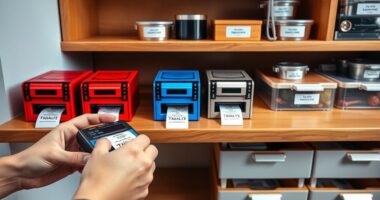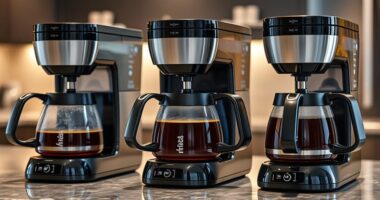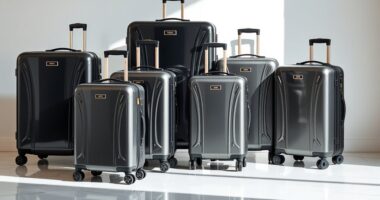If you’re looking for dependable home backup power in 2025, I recommend considering top models like the Generac Guardian 10kW, DuroMax XP13000EH, and Westinghouse 12500W. These standby generators are designed to handle large loads, operate on dual fuels, and include smart features for easy monitoring. For portability and outdoor needs, options like Jackery Explorer and OUPES portable stations are great. Keep exploring to find the best fit for your household needs and budget.
Key Takeaways
- High-capacity models like Generac Guardian 22kW and Westinghouse 28000 Peak Watt support entire home backup during outages.
- Features such as remote monitoring, weather resistance, and automatic safety shutoffs enhance reliability and user convenience.
- Dual-fuel and expandable generators like DuroMax XP13000HX and Anker SOLIX F3000 offer versatility for long-term, heavy-duty use.
- Professional installation, capacity planning, and noise considerations are critical for choosing the right standby generator.
- Modern units combine durability, fuel flexibility, and smart technology to ensure dependable performance in 2025.
Generac Guardian 10kW Home Standby Generator with Transfer Switch
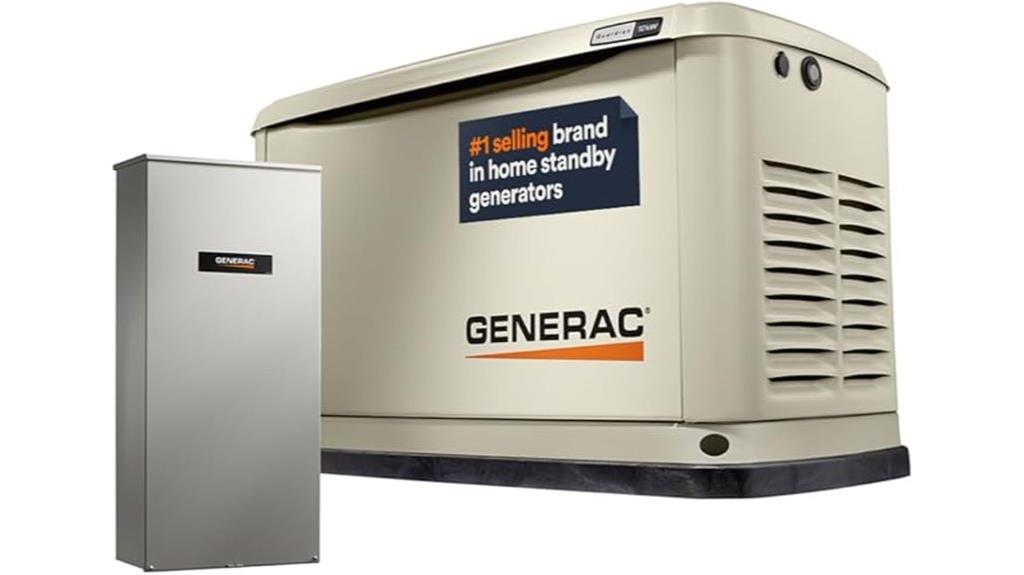
If you’re looking for a dependable standby generator that can power your entire home during outages, the Generac Guardian 10kW with Transfer Switch is an excellent choice. It delivers 10,000 watts of clean, stable power with less than 5% harmonic distortion, making it safe for sensitive electronics. The G-Force Engine ensures durability, efficiency, and quieter operation with minimal maintenance. Plus, with Generac’s Mobile Link Wi-Fi, you can monitor performance remotely, receive alerts, and stay informed no matter where you are. Its all-aluminum enclosure and 100 Amp transfer switch make installation seamless and reliable, backed by a 5-year warranty for peace of mind.
Best For: homeowners seeking a reliable, whole-house standby generator with smart monitoring features to ensure continuous power during outages.
Pros:
- Delivers 10,000 watts of clean, stable power suitable for entire home use
- Equipped with Wi-Fi connectivity for remote monitoring and maintenance alerts
- Durable all-aluminum enclosure and 5-year limited warranty enhance longevity and peace of mind
Cons:
- Professional installation by licensed electricians is recommended, adding to upfront costs
- May be more expensive than portable generators for smaller power needs
- Size and installation requirements might not be suitable for all property types
DuroMax XP13000EH Portable Dual Fuel Generator

The DuroMax XP13000EH Portable Dual Fuel Generator stands out as an excellent choice for homeowners who need reliable, high-capacity backup power in emergencies. It delivers up to 13,000 watts surge and 10,500 watts running power, capable of supporting essentials like HVAC, appliances, and electronics. Powered by a durable 500cc engine, it runs on gasoline or propane, providing flexibility during outages. With features like electric start, a sturdy steel frame, and transfer switch-ready outlets, it’s built for durability and ease of use. Weighing 234 pounds with portable wheels and a foldable handle, it’s designed to be both powerful and mobile when you need it most.
Best For: homeowners and emergency preparedness enthusiasts seeking a high-capacity, portable dual fuel generator capable of powering essential household appliances and electronics during outages.
Pros:
- Powerful 13,000-watt surge and 10,500-watt running capacity suitable for whole-home backup
- Dual fuel flexibility with gasoline and propane options for convenience and extended runtime
- Durable all-metal construction with mobility features like wheels and foldable handle for easy transport
Cons:
- Relatively heavy at 234 pounds, which may require assistance for moving
- Can be loud during operation, potentially disturbing in quiet environments
- Occasional reports of early component wear or manufacturing defects requiring warranty service
Champion Power Equipment 100177 8.5-kW Home Standby Generator
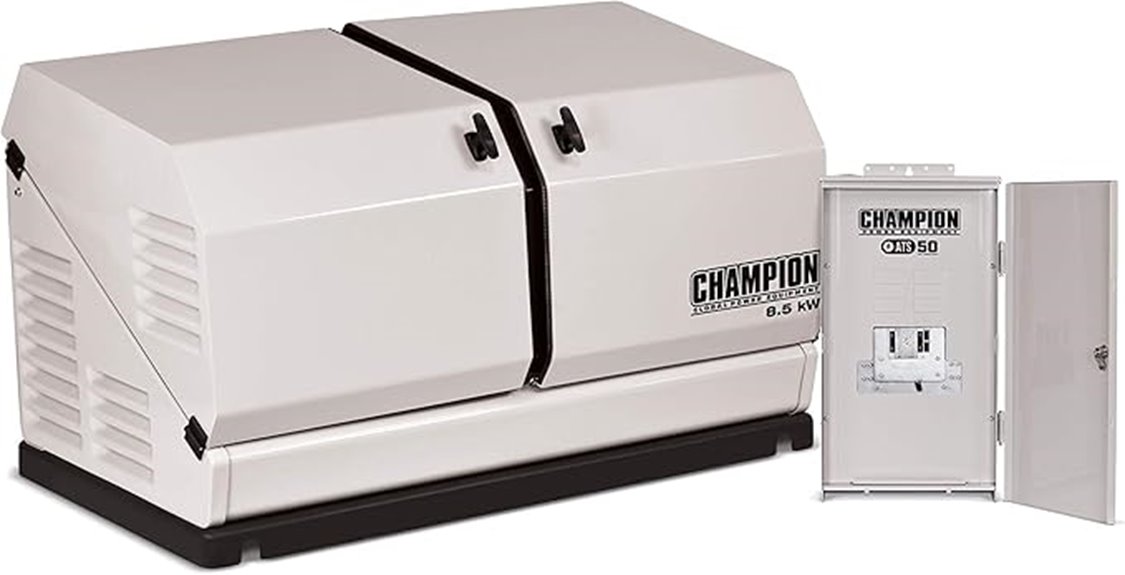
The Champion Power Equipment 100177 8.5-kW Home Standby Generator stands out for homeowners seeking reliable, maintenance-free backup power. It provides seamless 24/7 operation without refueling, manual startup, or extension cords. With a robust 10-year limited warranty, it offers peace of mind and durability. Its Sub Zero Start system ensures reliable performance even at -22º F. The innovative gullwing enclosure makes installation and maintenance straightforward, while the low-tone muffler keeps noise levels down. Equipped with an automatic transfer switch, it guarantees a smooth changeover during outages, making it an excellent choice for dependable home backup in any situation.
Best For: homeowners seeking a reliable, maintenance-free backup generator with seamless operation and easy installation.
Pros:
- Provides 24/7 power without refueling, manual intervention, or extension cords
- Equipped with a durable 10-year limited warranty for long-term peace of mind
- Features a Sub Zero Start system that ensures reliable startup down to -22º F
Cons:
- May have a higher upfront cost compared to smaller or portable generators
- Installation of the gullwing enclosure might require professional assistance
- Noise levels, while reduced, could still be noticeable in very quiet residential areas
Westinghouse 12500W Dual Fuel Portable Generator
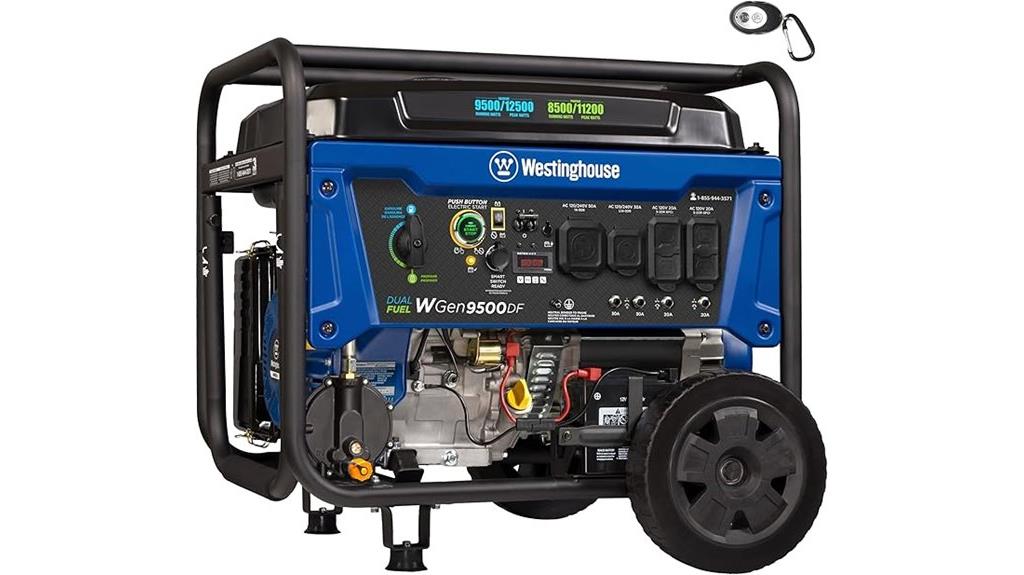
For homeowners seeking reliable backup power, the Westinghouse 12500W Dual Fuel Portable Generator stands out with its impressive 9500 running watts and flexible fuel options. It delivers up to 12 hours of runtime on a 6.6-gallon tank, supporting long outages. Powered by a durable 457cc engine, it offers real-time data via a digital display and includes safety features like low oil shutdown. With multiple outlets, including transfer switch-ready and RV-compatible options, plus remote start and easy setup, it combines performance and convenience. Backed by a 3-year warranty, this generator guarantees dependable power when you need it most.
Best For: homeowners and emergency preparedness enthusiasts seeking a reliable, versatile, and long-lasting dual-fuel generator for backup power during outages.
Pros:
- Provides up to 12 hours of runtime on a full tank with a powerful 9500 running watts for essential appliances
- Dual fuel capability allows flexible use with gasoline or propane, increasing convenience and fuel options
- Features remote electric start, digital display, and multiple outlets including transfer switch-ready and RV-compatible connections for ease of use and versatility
Cons:
- May be relatively heavy and bulky, requiring effort to transport and store
- Higher price point compared to smaller portable generators with fewer features
- Residual oil or fuel odor might be present due to factory testing and storage
WEN Tri-Fuel Generator (TF1450X)

If you’re looking for versatility and reliable backup power, the WEN Tri-Fuel Generator (TF1450X) stands out as an excellent choice. It runs on gasoline, propane, or natural gas, giving you flexible fueling options. With up to 12 hours of runtime on an 8.2-gallon tank, it’s perfect for home backup, camping, or job sites. It features multiple outlets, including 120V, 240V, and DC, plus safety sensors like the CO shutdown. Easy to move thanks to wheels and handles, it’s built for durability. The electric start and straightforward setup make it user-friendly, while its solid construction guarantees long-term performance.
Best For: homeowners, contractors, and outdoor enthusiasts seeking a versatile, reliable backup power source with multiple fuel options and easy portability.
Pros:
- Supports three fuel types—gasoline, propane, and natural gas—for maximum flexibility
- Up to 12 hours of runtime on an 8.2-gallon tank, suitable for extended use
- Equipped with multiple outlets and safety features like CO shutdown for versatile and safe operation
Cons:
- Heavy at approximately 252 pounds, which may require assistance for moving
- Noise level is average, potentially disturbing in quiet environments
- Requires regular oil changes and maintenance to ensure optimal performance
Westinghouse Portable Tri-Fuel Generator

When selecting a reliable backup power solution for a larger home, the Westinghouse Portable Tri-Fuel Generator stands out due to its impressive capacity and fuel flexibility. It delivers up to 14,500 peak watts and 11,500 running watts on gasoline, with adaptable options for propane and natural gas, making it versatile and convenient. It can power entire households, including A/C units and appliances, for up to 19 hours on a full tank. Its durable 550cc engine features low THD for sensitive electronics, and with electric start, remote control, and transfer switch-ready outlets, it offers reliable, user-friendly operation. This generator is ideal for all-encompassing home backup needs.
Best For: homeowners needing a powerful, versatile backup generator capable of running entire households with multiple appliances and sensitive electronics during outages.
Pros:
- Offers high power output up to 14,500 peak watts, suitable for large homes and multiple appliances.
- Tri-fuel capability provides fuel flexibility, allowing use of gasoline, propane, or natural gas.
- Equipped with transfer switch-ready outlets, remote start, and real-time monitoring for user convenience and safety.
Cons:
- Heavy at approximately 230 pounds, which may require assistance for transportation.
- Higher price point compared to smaller or less feature-rich generators.
- Larger size may require ample storage space and professional setup for optimal use.
Jackery HomePower 3000 Portable Power Station
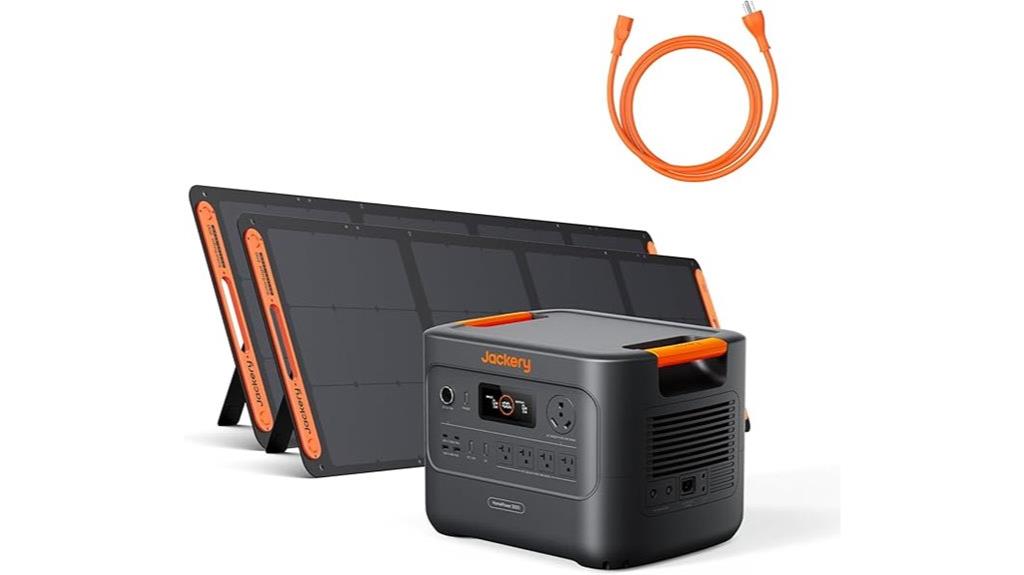
The Jackery HomePower 3000 Portable Power Station stands out as an excellent choice for homeowners seeking a reliable, versatile backup power solution during outages or outdoor adventures. With a 3600W continuous output and a 3072Wh LiFePO4 battery, it can power essentials like refrigerators, lights, and medical devices for hours or days. Its compact design, weighing about 59.5 pounds, incorporates multiple outlets, USB ports, and a seamless UPS switch. Fast recharging options include AC, solar panels, and car chargers, supported by AI-enhanced ChargeShield technology for longevity. While costly, its durability, smart features, and silent operation make it a top-tier, dependable backup option.
Best For: homeowners, outdoor enthusiasts, and emergency preparedness individuals seeking a reliable, versatile backup power solution with long-lasting capacity and smart features.
Pros:
- High continuous power output of 3600W with a 3072Wh LiFePO4 battery ensures reliable operation of household essentials and appliances.
- Compact, lightweight design (about 59.5 pounds) with wheels and a pull-out rod for easy portability and storage.
- Supports multiple charging methods, including AC, solar, and vehicle 12V, with AI-enhanced ChargeShield technology for extended battery lifespan.
Cons:
- Expensive solar panels and accessories increase overall system investment, making it costly for some users.
- Solar charging efficiency drops significantly in overcast or low-light conditions, potentially limiting outdoor use.
- The system’s input shuts off below 20W, which can hinder recharging in less sunny environments or with weak sunlight.
EF ECOFLOW Portable Power Station DELTA 2, 1024Wh LiFePO4 (LFP) Battery
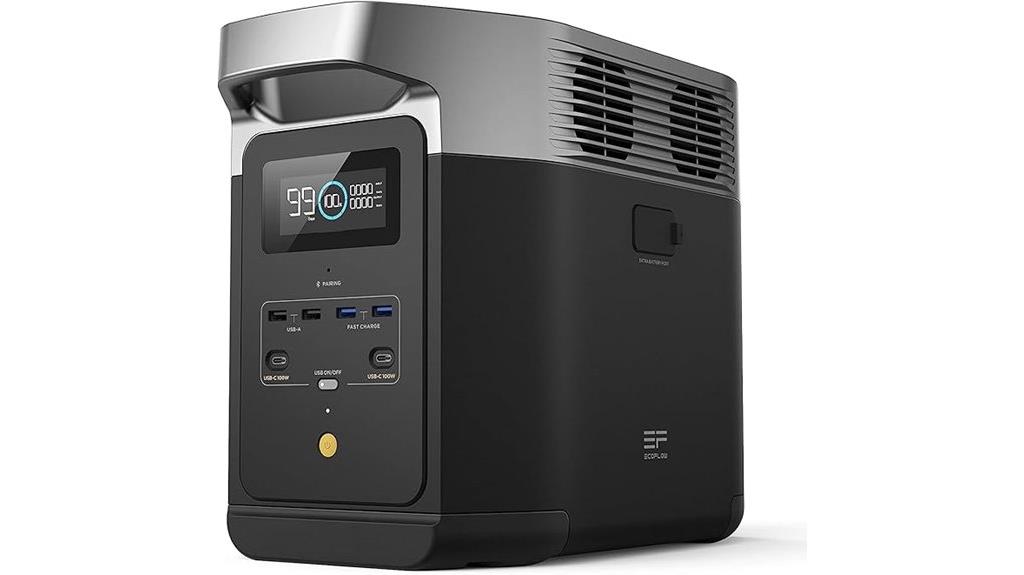
The EF ECOFLOW Portable Power Station DELTA 2 stands out for those seeking a versatile and expandable power source, especially in emergencies or off-grid situations. It packs a 1024Wh LiFePO4 (LFP) battery, with the option to expand up to 3kWh by adding extra batteries, making it ideal for camping, RV trips, or backup power. It charges quickly—80% in 50 minutes—and supports solar input up to 500W. With 1800W continuous AC power and 15 outlets, it can run most household appliances quietly and safely. Its durable design and long-lasting battery chemistry guarantee reliable, eco-friendly power for years to come.
Best For: outdoor enthusiasts, campers, and emergency preparedness individuals seeking a reliable, expandable portable power solution for off-grid and backup power needs.
Pros:
- Rapid charging capability (0-80% in 50 minutes) for quick power replenishment
- Expandable capacity up to 3kWh, suitable for larger appliances and extended use
- Long-lasting LiFePO4 chemistry with over 3000 charge cycles ensures durability and safety
Cons:
- Price may be higher compared to smaller or less feature-rich portable power stations
- Limited solar input capacity (up to 500W) may restrict rapid eco-friendly charging in some situations
- Heavier and bulkier design could be less portable for some users during transport
Westinghouse 28000 Peak Watt Portable Generator
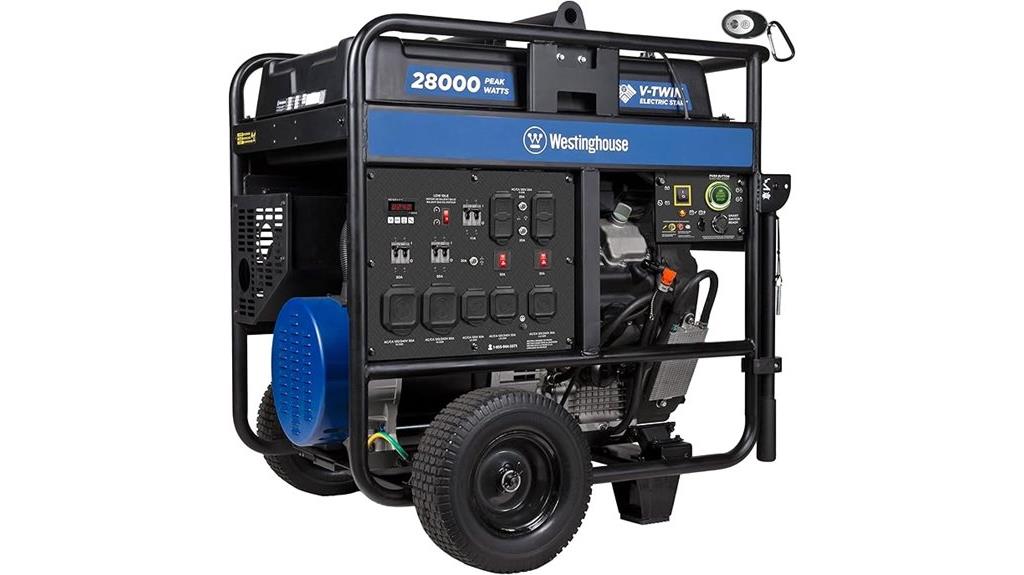
For those seeking a powerhouse portable generator capable of handling whole-house backup and large appliances, the Westinghouse 28000 Peak Watt Portable Generator stands out. It delivers 28,000 peak watts and 20,000 running watts, perfect for homes, sensitive electronics, and heavy-duty tools. Its durable 999cc V-twin engine produces clean power with low total harmonic distortion, ensuring safety for electronics. With up to 11 hours of runtime, multiple outlets, remote start, and safety features like CO sensors and automatic shutdowns, it offers convenience and reliability. Heavy-duty construction with reinforced handles and wheels makes it portable, though its weight and frame design require assistance for movement.
Best For: homeowners, construction sites, and outdoor enthusiasts needing reliable, high-capacity power for whole-house backup, large appliances, and sensitive electronics.
Pros:
- Powerful 28,000 peak watts and 20,000 running watts suitable for large loads and entire homes
- Advanced safety features including CO sensor, automatic shutdown, and low oil shutdown for peace of mind
- Remote electric start and multiple outlets provide convenience and versatility for various applications
Cons:
- Heavy weight (approximately 602 pounds) and small wheels make mobility challenging without assistance
- Frame may flex under lift, and build quality issues such as loose nuts or flimsy panels have been reported
- No pull-start option; assembly and moving may require extra effort and tools
Jackery Portable Power Station Explorer 300, 293Wh Solar Generator
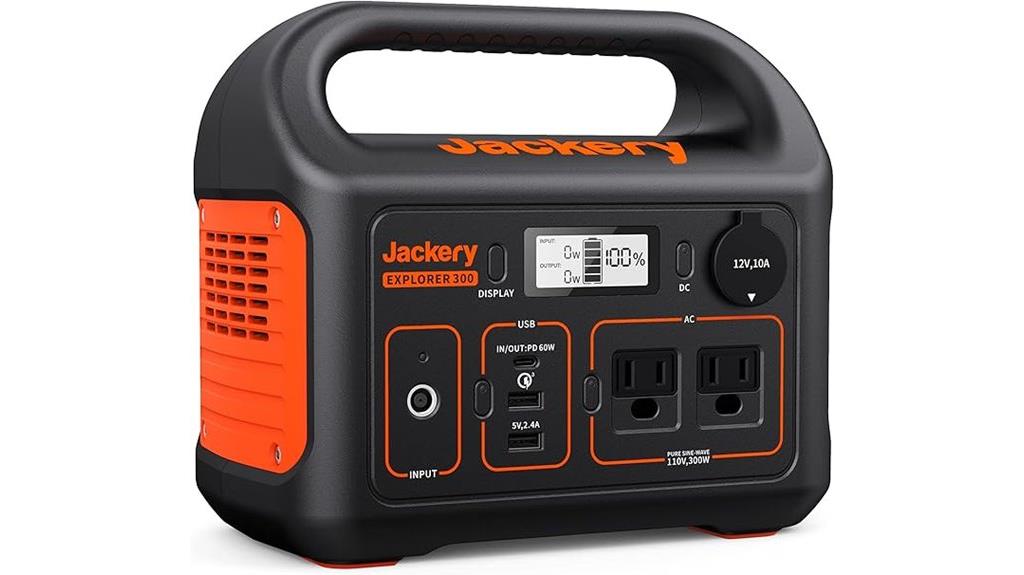
If you’re seeking a compact, lightweight power solution for outdoor adventures or emergency backup, the Jackery Portable Power Station Explorer 300 stands out with its 293Wh lithium-ion battery. Weighing just 7.1 pounds, it’s easy to carry and perfect for camping or road trips. It features two Pure Sine Wave AC outlets that deliver stable, safe 300W power, supporting up to six devices simultaneously. Recharging is quick—80% in two hours via wall outlet or solar panel. Compatible with the Jackery SolarSaga 100, it’s eco-friendly and efficient. The Explorer 300’s versatility and portability make it an excellent choice for off-grid power and emergency preparedness.
Best For: outdoor enthusiasts, campers, and emergency preparedness individuals needing portable, reliable power on the go.
Pros:
- Lightweight and portable at only 7.1 pounds, easy to carry during outdoor activities.
- Supports fast recharging, reaching 80% in just 2 hours via wall outlet or solar panel.
- Capable of powering up to six devices simultaneously with stable Pure Sine Wave AC outlets.
Cons:
- Solar panel sold separately, requiring additional purchase for solar charging.
- Limited to 293Wh capacity, which may not be sufficient for high-power or extended use.
- No built-in Wi-Fi or app connectivity for remote monitoring.
DuroMax XP13000HX Dual Fuel Portable Generator

When selecting a portable generator capable of handling essential home appliances during outages, the DuroMax XP13000HX stands out with its impressive 13,000-watt dual-fuel power. With a robust 500cc OHV engine, it can support lights, refrigerators, and even central A/C. Its flexible fuel options—gasoline or propane—make it cost-effective and convenient, with quick switching between fuels. The generator features electric start, a digital display, and a variety of outlets, including transfer switch-ready options. Built with durable steel and equipped with wheels and a handle for portability, it’s designed for reliable home backup during storms or power outages.
Best For: homeowners seeking a reliable, versatile, and portable backup power solution during storms or outages.
Pros:
- Dual fuel capability allows flexibility with gasoline or propane, enhancing convenience and cost-efficiency.
- High power output of 13,000 watts supports essential appliances, including central A/C, during emergencies.
- Durable construction with wheels and handles makes it portable despite its heavy weight.
Cons:
- Relatively heavy at 245 pounds, which may require assistance for transportation.
- Larger size may limit storage space in smaller environments.
- The noise level during operation can be significant, potentially disturbing nearby areas.
Westinghouse 12500 Peak Watt Tri-Fuel Portable Generator
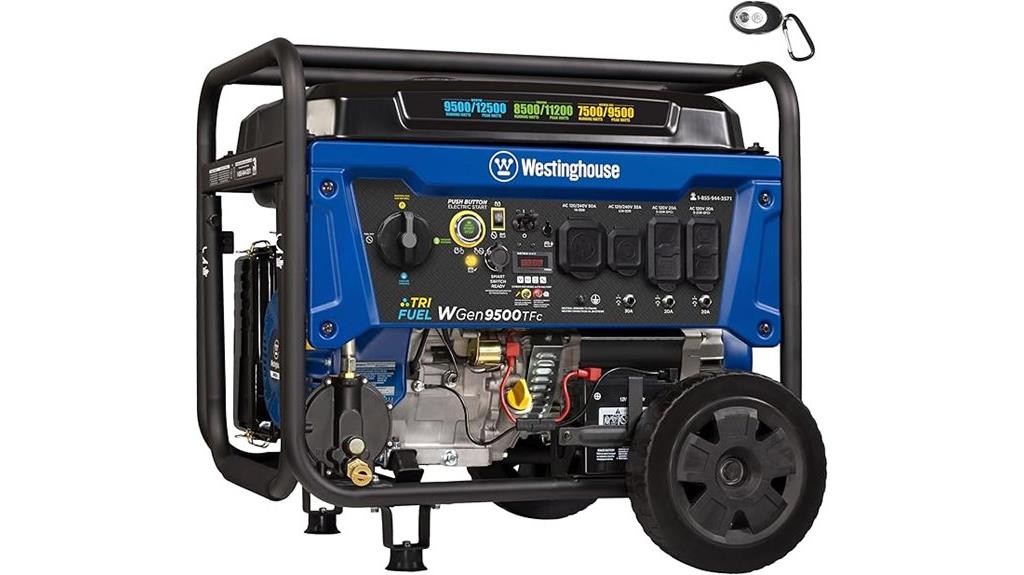
The Westinghouse 12500 Peak Watt Tri-Fuel Portable Generator stands out for anyone seeking versatile, reliable backup power during outages or on the job site. It delivers up to 12,500 peak watts and 9,500 running watts on gasoline, with comparable power on propane and natural gas, giving you fuel flexibility. Its durable 457cc engine runs up to 12 hours on a 6.6-gallon tank, with safety features like automatic low oil shutdown and a CO sensor. Easy to start with push-button electric start and remote key fob, it also offers multiple outlets for various applications. Its sturdy design and positive reviews make it a dependable choice for home backup in 2025.
Best For: homeowners, RV owners, and contractors seeking a versatile, reliable tri-fuel generator for backup power, job sites, or recreational use.
Pros:
- Offers high peak and running wattages across three fuels (gasoline, propane, natural gas) for maximum flexibility
- Easy to operate with push-button electric start and remote key fob, plus multiple outlets for various devices
- Durable construction with a long runtime of up to 12 hours and built-in safety features like CO sensor and low oil shutdown
Cons:
- Can be relatively heavy and bulky, making transport less convenient despite heavy-duty wheels and handles
- Some users report noise and vibration levels that could benefit from sound dampening solutions
- Requires regular maintenance and proper fuel management to ensure longevity and optimal performance
Jackery Explorer 2000 v2 Portable Power Station
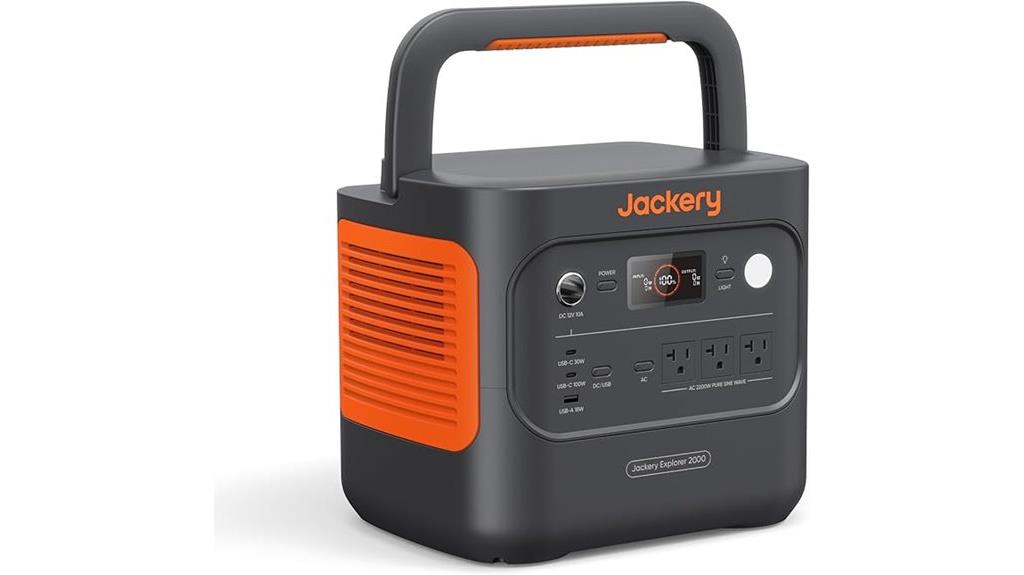
The Jackery Explorer 2000 v2 Portable Power Station stands out as an ideal choice for anyone needing reliable, high-capacity backup power that’s both portable and eco-friendly. With a 2042Wh LiFePO4 battery, it delivers a total 2200W from three AC outlets, perfect for home backup, camping, or small business needs. Weighing just 39.5 pounds, it’s lighter and smaller than comparable units, thanks to advanced EV cell technology. It offers fast charging—0-80% in 66 minutes—and solar recharge in as little as six hours. Its silent operation, long-lasting battery, and safety features make it a dependable, eco-friendly alternative to gas generators.
Best For: individuals seeking a reliable, high-capacity portable power station for home backup, outdoor adventures, or small business operations with eco-friendly and silent features.
Pros:
- High-capacity 2042Wh LiFePO4 battery ensures long-lasting power for various applications.
- Fast charging capabilities, reaching 80% in just 66 minutes and full charge in 102 minutes via app.
- Quiet operation with noise levels below 30dB, making it suitable for sleeping or working environments.
Cons:
- Weighs 39.5 lbs, which may still be considered heavy for some portability needs.
- Cannot be shipped to PO Box addresses, requiring an actual physical shipping address.
- Limited to a maximum of 2200W total output, which may not be sufficient for larger power demands.
OUPES Mega 1 Portable Power Station (1024Wh)
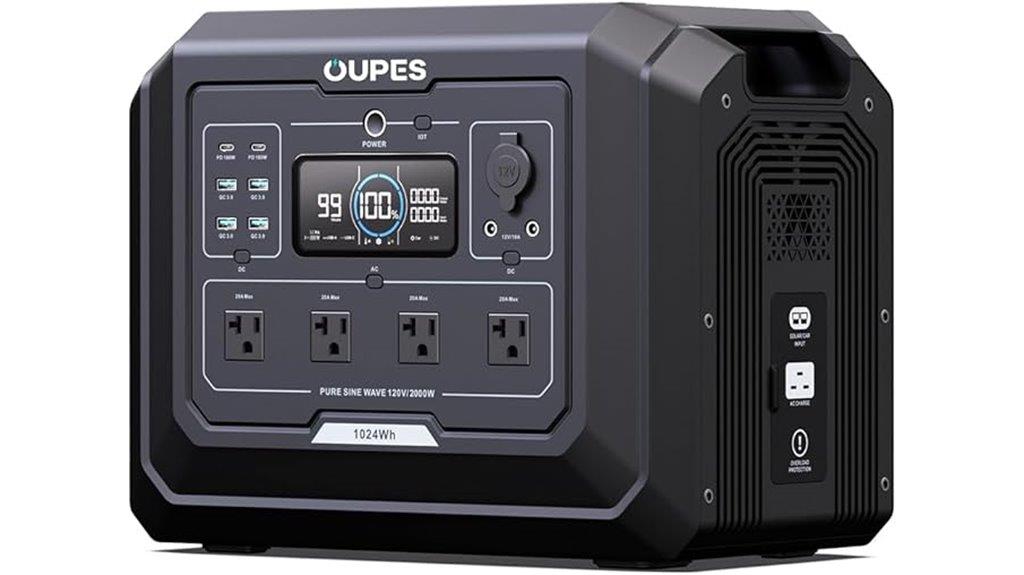
For those seeking a portable power solution that combines high capacity with safety and expandability, the OUPES Mega 1 Portable Power Station stands out. It features a 1024Wh LiFePO4 battery, expandable to 5120Wh with an extra B2 battery, surpassing many competitors. Its 2000W continuous output supports heavy appliances like refrigerators and power tools. The LiFePO4 technology offers safer, longer-lasting performance. With multiple charging options—solar, AC, or car—and an efficient MPPT controller, recharging is quick and flexible. Its versatile outputs, smart app control, and compact design make it ideal for camping, emergencies, or home backup, providing reliable power when you need it most.
Best For: camping, off-grid living, and emergency preparedness enthusiasts seeking a high-capacity, expandable, and safe portable power solution.
Pros:
- Large 1024Wh LiFePO4 battery with expandability to 5120Wh for extended use
- Supports high-watt appliances with 2000W continuous output and multiple versatile outlets
- Fast and flexible charging options including solar, AC, and car power with efficient MPPT controller
Cons:
- WiFi connectivity for app control can be inconsistent; Bluetooth is more reliable
- Relatively heavy at 27.8 pounds, which may impact portability for some users
- Higher initial cost compared to smaller or less expandable portable power stations
Anker SOLIX F3000 Portable Power Station with Home Backup Kit

When choosing a portable power solution that can handle long-term outages or demanding outdoor activities, the Anker SOLIX F3000 Portable Power Station with Home Backup Kit stands out thanks to its massive 3,072Wh capacity and expandable design. It can be increased to 24kWh, supporting multiple devices simultaneously, including demanding appliances with its 3,600W continuous output. Recharging is ultra-rapid at 6,000W, combining solar and grid power. Weighing 100.3 pounds, it’s portable enough for outdoor use but durable enough for emergency backup. Its pass-through charging and smart energy features ensure reliable, long-lasting power, making it an ideal choice for home or outdoor scenarios.
Best For: individuals seeking a powerful, expandable portable energy solution for long-term outages, outdoor adventures, or emergency backup.
Pros:
- Massive 3,072Wh capacity that can be expanded to 24kWh for extended power needs.
- Ultra-fast recharging at 6,000W with solar and grid support, ensuring quick turnaround times.
- Supports both 120V and 240V outputs, allowing operation of multiple appliances simultaneously.
Cons:
- Heavy weight of 100.3 pounds may limit portability for some users.
- No batteries are included or required, which could add to initial setup complexity if additional batteries are desired.
- Higher price point reflecting its capacity and features may be a barrier for budget-conscious buyers.
Factors to Consider When Choosing Standby Generators for Home Backup
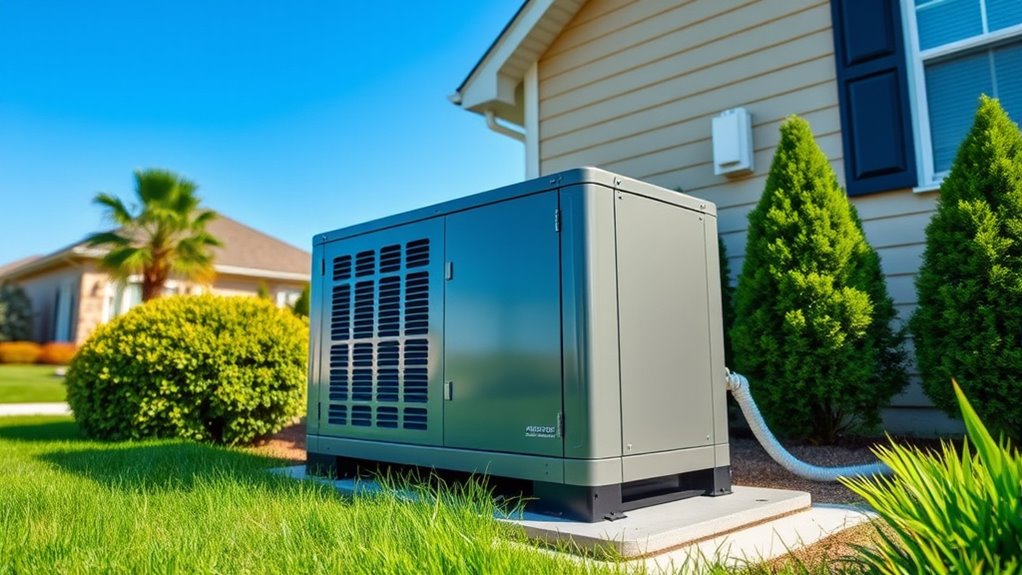
When choosing a standby generator, I focus on matching its power capacity to my home’s needs and considering fuel options that suit my setup. I also keep noise levels, installation complexity, and my budget in mind to guarantee I get the best fit. These factors help me select a reliable generator that balances performance and convenience.
Power Capacity Needs
Choosing the right standby generator starts with understanding your home’s power capacity needs. I recommend calculating the total wattage of essential appliances and systems to make sure the generator can handle their combined load. Pay attention to both starting (surge) and running wattages, especially for appliances with motors or compressors, which draw more power at startup. It’s wise to take into account future expansion, so selecting a generator with a higher capacity than your current needs helps avoid upgrades later. Use detailed load calculations to match the generator’s continuous wattage output with your household’s average consumption. Keep in mind that larger homes or those with high-energy appliances might require generators rated for 10kW or more to meet peak power demands efficiently.
Fuel Type Compatibility
Selecting a standby generator that matches your home’s fuel source is vital for reliable backup power. The right fuel type—natural gas, propane, or diesel—can influence installation and operation. Some generators are designed to run solely on natural gas, while others support dual-fuel or tri-fuel options, offering greater flexibility based on your fuel availability. Your choice affects how easily the system integrates with existing fuel lines or tanks. Additionally, fuel type impacts operational costs; propane and natural gas are cleaner and more economical than gasoline. Ensuring compatibility with your preferred fuel simplifies maintenance, extends the generator’s lifespan, and guarantees dependable power during outages. Picking the right fuel type is a imperative step toward a dependable and efficient backup system for your home.
Noise Level Considerations
Noise levels are a crucial factor to consider because a loud generator can disrupt your home’s peace and neighborhood comfort. Most standby generators produce between 50-60 dB, similar to normal conversation, making them relatively quiet. However, high-capacity models often exceed 70 dB, which can be disruptive. Features like sound-dampening enclosures, mufflers, and low-tone mufflers can greatly reduce noise, enhancing residential suitability. Proper placement outdoors, away from windows and living spaces, also helps minimize perceived sound. Some models are designed for ultra-quiet operation, maintaining noise levels below 55 dB even under full load. Choosing a generator with lower decibel levels ensures you stay comfortable and maintain good neighborhood relations, especially during extended outages.
Installation Complexity
Installing a standby generator can be a straightforward process or a complex project, depending on your home’s setup and local regulations. Typically, a professional electrician handles the installation to verify compliance with electrical codes and safety standards. More complex setups involve integrating the generator with your existing wiring and installing a transfer switch, which can take anywhere from several hours to days, depending on your home’s layout. Factors like the generator’s proximity to fuel sources, ventilation needs, and outdoor placement can add to the complexity. Additionally, some models require permits or inspections from local authorities before installation. The more advanced or integrated the system, the higher the labor and setup costs tend to be, making complexity a key factor in your overall investment.
Budget and Warranty
When choosing a standby generator, it’s essential to take into account both your budget and the warranty offered, as these factors directly impact your long-term investment. Start by considering the initial purchase price and guarantee it fits within your financial constraints. Look for extended warranties, ideally 5 to 10 years, which provide greater protection and peace of mind. Make sure to review what the warranty covers—parts, labor, and defect repairs—so you’re fully aware of potential costs. It’s also wise to research the manufacturer’s support reputation and responsiveness, as good customer service can make a big difference. Finally, factor in future repair costs after the warranty expires to determine the generator’s overall value and longevity.
Frequently Asked Questions
What Are the Maintenance Requirements for These Backup Generators?
Maintenance for these backup generators mainly involves regular oil changes, checking coolant levels, and replacing filters as needed. I also recommend running the generator periodically to ensure it’s operational and charging the battery. Keep an eye on fuel levels and inspect for any leaks or corrosion. Staying on top of these simple tasks helps keep your generator dependable, ready to kick in whenever you need it.
How Do Noise Levels Compare Among Different Generator Models?
Noise levels vary among different generator models, but I’ve found that inverter generators tend to be the quietest, often operating around 50-60 decibels. Conventional standby generators can be louder, reaching 70-80 decibels, which is comparable to city traffic. When choosing a generator, I recommend checking the decibel ratings and considering models with noise-reduction features, especially if you want to keep sound levels down during power outages.
Are Portable Generators Suitable for Long-Term Home Backup Use?
Did you know that only about 15% of homeowners use portable generators as long-term backups? I wouldn’t recommend it. Portable generators aren’t designed for continuous use, which can cause overheating and wear. They’re better suited for short-term needs or emergencies. For reliable, long-term backup power, a standby generator is a smarter, safer choice because it’s built to run consistently and handle your home’s energy demands.
What Safety Features Should I Look for in a Standby Generator?
When choosing a standby generator, I look for safety features like automatic shutoff if carbon monoxide levels get too high, ensuring my family’s safety. I also prioritize models with ground fault circuit interrupters (GFCIs) to prevent electrical shocks, and corrosion-resistant enclosures for durability. A clear, user-friendly control panel and automatic transfer switch give me peace of mind, making sure my home stays safe and powered during outages.
How Do Fuel Efficiency and Consumption Impact Operating Costs?
Fuel efficiency and consumption directly impact my operating costs, making it essential to choose a generator that balances power with economy. While a more efficient model may cost more upfront, it saves money over time through lower fuel bills. I weigh this trade-off carefully, knowing that a generator with better fuel efficiency reduces ongoing expenses and minimizes environmental impact, ensuring reliable backup power without draining my wallet.
Conclusion
Choosing the right standby generator means considering reliability, power, and flexibility. It’s about ensuring safety during outages, comfort in any storm, and peace of mind in every moment. Because when you prioritize preparedness, you prioritize your home and family. So, whether you need steady backup or portable power, remember: the best generator supports your life, sustains your comfort, and secures your peace of mind—today, tomorrow, and beyond.



